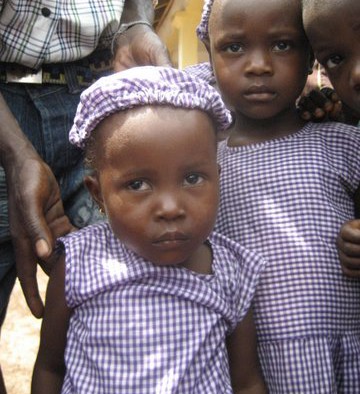Greetings from the gold capital of Ghana, Obuasi town, where $8 US can buy you a night’s sleep with spit-stained floorboards, shared and faucetless showers, and sheets decorated with the chest hairs and crumbs of innumerous prior visitors. “Silence Hotel” wasn’t named for the quietude of the place – it’s in the center of town, backing up to a shanty village armed with a battalion of screaming children. Instead, the name seems cautionary to anyone who would share all the secrets going on behind these creaky, paint-flaking doors. So many men here chatting me up! So many accompanied by “a friend of my wife – I’m just taking her home.”
Obuasi really is the center of the Gold Coast’s mining scene. AngloGold Ashanti (multinational mining company) is visible in all the wrong ways: mountains are lopped off at the top, descending into pits a mile deep; giant machinery surrounds the community; sad-looking miners sit at bars but order little (one 51-year-old told me he worked his way up to a $3-a-day salary in his 32 years of service, but he says it’s not enough to educate his 5 children). AGA transports workers to the mine in school buses and cage-like gondolas, and executives live in huge houses scattered in the hills skirting town. The town itself is a string of dusty, unpaved, car-less side streets dangling off the main drag. I’ve met mine workers, mine experts, and their families, and I’ve yet to hear a good word about the operation that has fuelled this so-called economy for generations.
BUT, the town itself is tiny, disgusting though it may be. And the outskirts are peppered with housing projects – with lawns, running water, electricity and sewage lines – constructed by AGA and filled with workers and their families. There’s a large, pretty primary and secondary school that looks like it could hold every student in Obuasi.
So why the complaints? Compared to the villages around SRL, these people have ‘everything’. Fear not, I’ll ponder this and write an essay on it, but I’ll spare you the details here.
So no paved roads, no happy locals, no burgeoning middle class. You know what IS here, though? ‘Medicine’ salesmen, and itinerant preachers. They hop on buses selling their various promises, and people buy. That this is where salaries are sometimes spent suggests that the formalized systems established by government and company aren’t fulfilling certain needs or expectations. What illnesses are better treated by medicine men than doctors? I haven’t sorted this yet.
Store names, toothpaste, everything seems to have Christian overtones: “‘Only God Can Do’ Mobile Phone Repairs” is my favorite. There’s a sign en route to the mine that reads: “No blood will touch the ground / do you believe it?” Not sure what to make of that.
Had fufu (pounded cassava paste) with mudfish soup at my new best friend Lily’s house yesterday. Being a dinner guest in Ghana is not a time-oriented experience. There are no mealtimes, people eat when they’re hungry. The family was confused that I thought I should wait til everyone was served.
Off to the processing plant!



